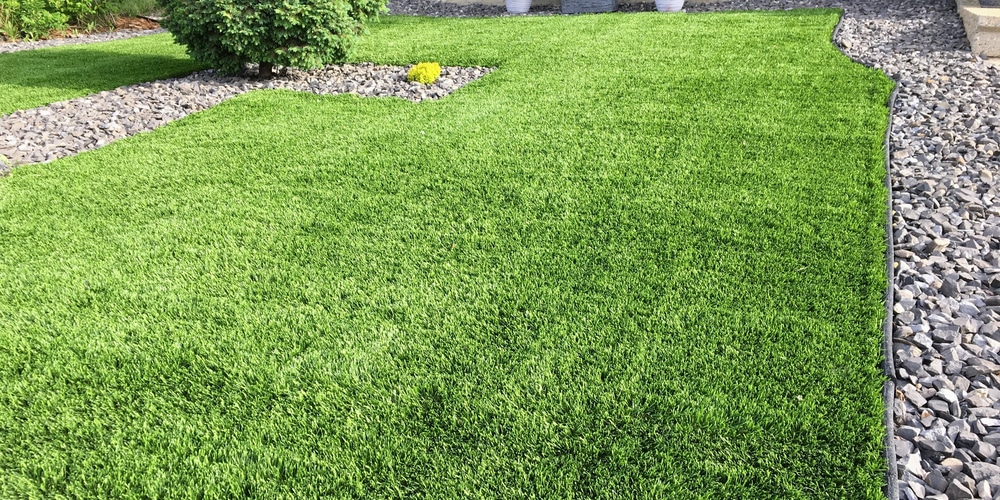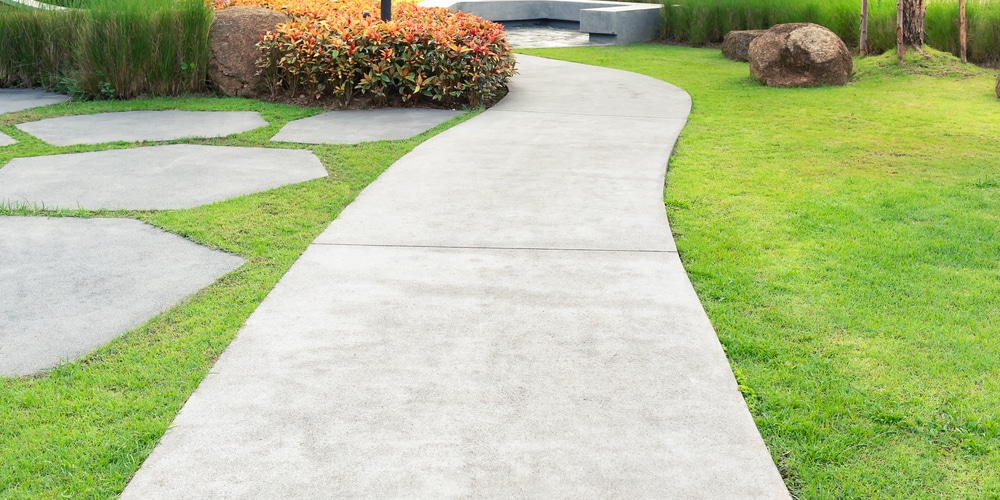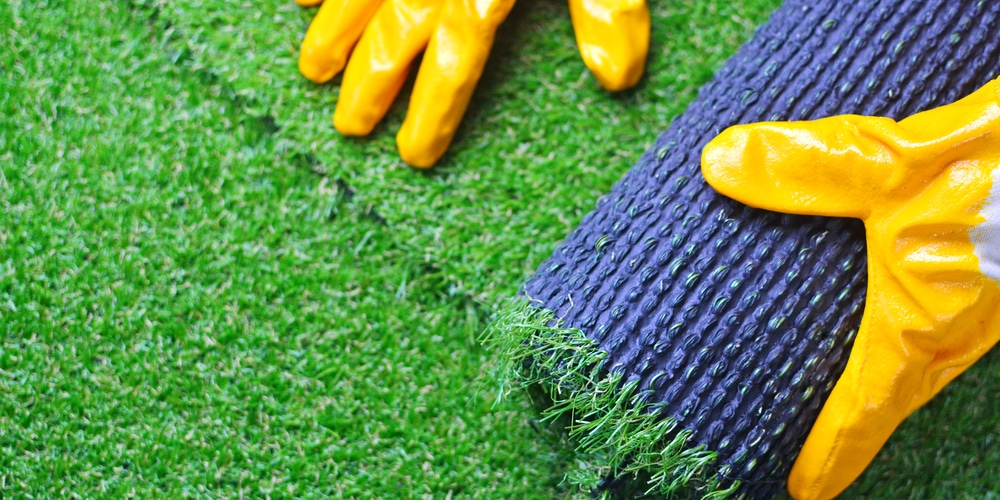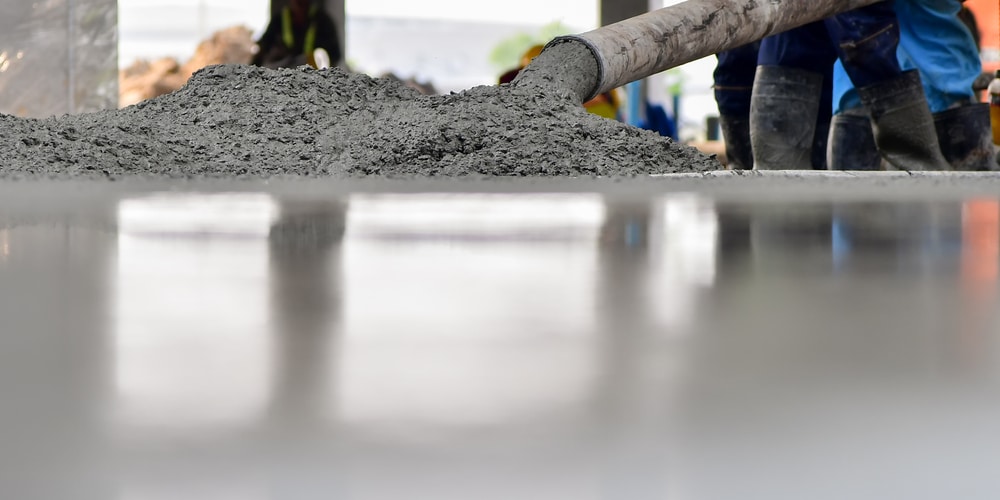This article will compare concrete vs artificial grass, to help you determine which would be the best low maintenance idea for your yard.
Many busy homeowners are thinking about how they can prepare their yards to look great with little maintenance. Artificial grass lawns are certainly one way to go about this. They provide a safe, comfy surface for kids and pets while also saving time in yard clean-up.
On the other hand, concrete may be a good surface for some, particularly for patios and driveways. Let’s compare these two surfaces and help you decide between artificial grass vs concrete.
Artificial grass vs concrete


Here are some things you may like to consider before choosing between artificial grass and concrete.
Cost of installation
Artificial grass is very inexpensive. This can be a great option if you are on a budget or even for people who don’t want to spend money on lawn care. You also won’t need extra upkeep costs since it requires fertilizer, mowing, watering, etc. Concrete is more expensive to install but can be a good option if you want a more durable surface.
Here’s how to calculate how much it would cost to install artificial turf on concrete. It can also cover a deck just fine.
Maintenance of surfaces
With artificial grass, you won’t have to spend any time on yard clean-up or maintenance, but you will need to wash the grass from time to time.
Concrete will take more effort as you’ll need to seal it every few years and clean up dirty spots as they arise. You’ll also need to keep weeds away from the concrete surface.
Safety for kids and pets
Artificial grass is very safe as it doesn’t have any hidden dangers underneath. Kids can play on the surface with no worries about them falling or getting cut by loose stones. Concrete may be more dangerous for young children since the surface is hard.
Unlike a regular yard, dogs can’t dig up artificial grass.
Artificial Turf: Deeper Dive
Now that we’ve covered the basic pros and cons of artificial grass vs concrete, let’s take a deeper dive into each.

Artificial Turf Pros
- Artificial turf requires less maintenance than real grass
- Options for fake grass are limitless when it comes to style and design
- Artificial grass has no bad odors like real grass does
- Artificial turf won’t cause any allergies or skin reactions
- Doesn’t require any fertilizer or water
Artificial Turf Cons
- Artificial grass is not a perfect replacement for natural grass.
- Overuse of fake grass could impact drainage in your yard if you live in a rainy area.
installation
Artificial grass installation costs are falling steadily as the technology improves and people become more accustomed to synthetic lawns. Grasslands across the nation and worldwide are being converted to synthetic surfaces to meet the growing demand for these easier-to-maintain lawn alternatives.
Unless you’re really good at DIY and know what, you’re doing its best to call in the professionals when it comes to laying artificial grass.
Concrete: Deeper Dive

Concrete Pros
- Concrete is very durable, which makes it great for driveways, sidewalks, and stairs.
- Concrete is unique as it can be designed to look like any other surface, such as brick, cobblestone, and tile. This makes it a versatile option for those wanting a different-looking patio or sidewalk.
Concrete disadvantages
- You will need to pay extra money to maintain the surface. This can be done by sealing the surface or applying an anti-skid coating.
- Creating a concrete surface for a patio or sidewalk may take several days.
- You’ll need to be careful when it comes to pouring concrete around your home. If you don’t use proper chemicals and techniques, the concrete could crack or crumble away once it starts to dry out.
Installation
When installing concrete around your home, there are some things that you’ll want to keep in mind. Make sure that you don’t pour the concrete too fast, as this can cause it to crack. Also, check the concrete every hour after you pour it in order to see if there are any cracks forming.
You will need to use a broom or power washer to clean the concrete. This is important because it helps remove dirt, oil, and grime from the surface of the ground.
Conclusion: Concrete vs Artificial Grass
Concrete is a great surface to choose for many different reasons. It’s very durable, which makes it perfect for driveways, sidewalks, and stairs. However, you should be careful about cracks forming in the cement.
Artificial grass offers endless options for design and durability, making it a great option for homeowners. It’s also a safer option if you have children and pets as the surface is softer.
Related: Artificial grass vs sod